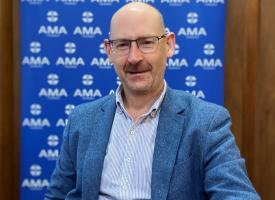Transcript - AMA President, Dr Michael Gannon, 6PR - Electronic Health Record
Transcript: AMA President, Dr Michael Gannon, 6PR, 5 July 2017
Subject: Security of Australian digital medical records
TIM MCMILLAN: Yesterday, there were major concerns around the safety of Medicare records. A journalist at The Guardian came across some Medicare details that were, effectively, for sale on the dark web. That is now a matter in the hands of Federal authorities. The AMA today, though, is expressing concerns about some of the knock-on effects of this, particularly around the digitisation of our medical files, which is a program that's going to start rolling out in the next year or so. The President of the AMA, Dr Michael Gannon, joins us on the program this morning.
Dr Gannon, hello.
MICHAEL GANNON: Good morning, Tim, how are you?
TIM MCMILLAN: Yeah, well, thank you. You must have been a little bit concerned about this program given some of the revelations that came out yesterday.
MICHAEL GANNON: Yeah, we were hugely concerned, and especially when it was asserted to me by a couple of journalists that this could lead to a breach of the electronic health record. I've sought and been given reassurances this morning by both the relevant minister, Alan Tudge, and by Tim Kelsey, the head of the Australian Digital Health Agency, that there is no risk to people who have a MyHealth record. That's been of great reassurance to me.
TIM MCMILLAN: Can you just talk us through what the MyHealth initiative is? As I understand, it's about people opting to have their medical files digitised, if you like, so that they can be used and cross-referenced across the health sector. Is that right?
MICHAEL GANNON: Yeah, absolutely. Now, there's already about four million Australians that have an electronic health record – a MyHealth record – and obviously, the ultimate aspiration is for a health professional – so a doctor or a physio or a midwife – seeing you anywhere across Australia to be able to access important health information about you. Now, the exciting thing about this initiative is that it means that if you're seeing a doctor on the other side of the country when you're on holidays, they'll have information about you. But we have this perverse situation where there's people here in Perth who might have paper records at five, six, or seven different hospitals, they might have records at two or three different GPs, and those doctors – let's say in the emergency department at Royal Perth Hospital – can't read an x-ray report or an MRI report from SKG or PRC. Now, the ultimate aspiration is that everyone will have all that information; that'll mean that we'll have less adverse drug reactions, less duplication of tests; especially tests that cost money or have radiation exposure. So the AMA is strongly supportive of the nationwide rollout of the electronic health record. The reason I was so concerned yesterday is that if there's any threat to the integrity of that information, doctors and patients will walk away from the project.
TIM MCMILLAN: Yeah, because it is a voluntary thing, is that right? That it's up to the individual to say, yes, I'm happy for my records to go digital.
MICHAEL GANNON: Well, it has been opt-in, and there's two parts of Australia where they did an opt-out trial, and that was very successful, so the next step is to move towards opt-out. In other words, if you don't say, no, I don't want my record available electronically, one will be generated for you. So again, that's why this issue was so concerning yesterday. If there's any possible threat to confidential patient information, Australia's doctors will speak up. I'm happy that I've been given reassurances today, and we're getting a further briefing from the Commonwealth Health Department later this morning.
TIM MCMILLAN: I completely understand the logic behind wanting to get files on digital record so that they're transferable across States, across sectors, Dr Gannon. Equally though, I can understand people being a little bit apprehensive. I mean, we had this breach that came to light yesterday. I'm thinking, too, about the census data breach, as well. People who don't understand these up to date technologies; I can kind of understand them being a little bit trepidatious.
MICHAEL GANNON: I couldn't agree with you more, Tim, and I'm certainly not the IT expert in town, but this is very different to what happened with the census. That was a very sophisticated, deliberate hack. This is looking more and more like minor criminal activity, but what is absolutely essential is that people understand and they're confident that sometimes very personal, confidential information remains that. That is why we have sought early and robust reassurances from the top, and I spoke to Minister Tudge this morning; I'm happy that they're taking care of it.
TIM MCMILLAN: So you're pretty happy with the safeguards that they've told you are in place?
MICHAEL GANNON: Yes, and further, today, again, I spoke to the head of the Australian Digital Health Agency. They run real-time surveillance, so they know who's looking at patient records. If someone's looking at your medical record in a deep, dark room in a hospital, we don't know that. This, again, is where the electronic health record is the future, but we understand people's nervousness about it. The integrity of it must be guaranteed for people to buy into this new project.
TIM MCMILLAN: It's obviously a pretty big process to undertake. In 2012, as I understand, the MyHealth record initiative launched; about one in five Australians have signed up to it, so you've still got a huge section of the population to go.
MICHAEL GANNON: Look, the personally-controlled electronic health record has had a long and fairly unhappy history. Well, north of $1.5 billion of taxpayers' money has gone into it, but I'm satisfied that, in many ways, the project is back on track. It is the future, but both doctors and patients need reassurance constantly that the integrity of the information is absolutely guaranteed.
TIM MCMILLAN: Yeah, let's hope it plays out that way. Dr Michael Gannon, appreciate your time this morning.
MICHAEL GANNON: That's a pleasure, Tim.
5 July 2017
CONTACT: John Flannery 02 6270 5477 / 0419 494 761
Follow the AMA Media on Twitter: http://twitter.com/ama_media
Follow the AMA President on Twitter: http://twitter.com/amapresident
Follow Australian Medicine on Twitter: https://twitter.com/amaausmed
Like the AMA on Facebook https://www.facebook.com/AustralianMedicalAssociation



